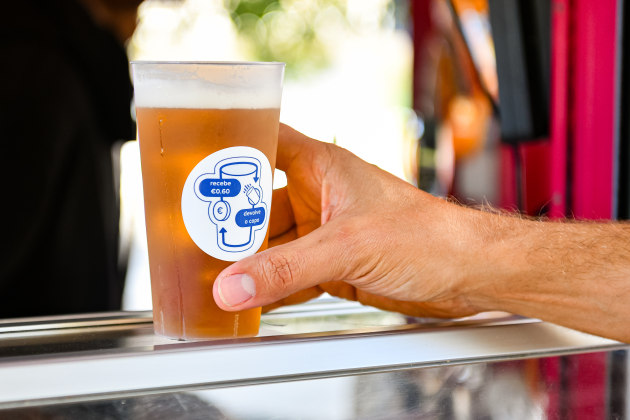As reusable systems gain traction globally, news from Portugal is that Lisbon has kicked off a city-wide reusable cup scheme, aiming to cut down on waste and carbon emissions in its busy hospitality and nightlife scene.

The effort is a joint venture between the City of Lisbon, recycling tech company Tomra, and AHRESP, Portugal’s largest hospitality association. At the heart of the project is Tomra’s “Rotake” system, which oversees everything from digital tracking to cleaning and redistributing the reusable cups. The first return kiosks opened on 27 June in Praça de Sao Paulo and Praca do Príncipe Real, with a broader rollout planned for October 2025.
When buying a drink served in a reusable cup, customers put down a €0.60 deposit. They can then get this back by tapping a contactless card or phone at a return point. The process doesn’t require registration, aiming to keep things simple.
Geir Saether, head of Tomra reuse, said, “The system deployed in Lisbon is designed specifically for urban areas, making reuse easy, clean and rewarding for everyone involved.”
The scheme ties into Lisbon’s regulations banning single-use plastic cups, which have created the groundwork for reuse-friendly infrastructure. Rui Cordeiro, the city’s councillor for waste management and circular economy, said Lisbon is “committed to leading by example, promoting sustainable alternatives to single-use plastics and engaging partners in real change toward more conscious consumption habits.”
AHRESP is helping to bring cafés, bars and nightlife venues on board. Its president, Carlos Moura, described the initiative as a significant change, it “represents a necessary shift for the hotel/restaurant/catering sector, which now takes on an active and central role in the transition towards a more circular economy.”
Lisbon’s approach follows a similar system already in place in Aarhus, Denmark, where over a million cups have been returned with a success rate above 85 per cent. The city hopes to beat that figure and become a model for other European capitals.
By October, the aim is for a single “Lisbon cup” to be in use throughout key neighbourhoods, with 17 return locations to support it.






